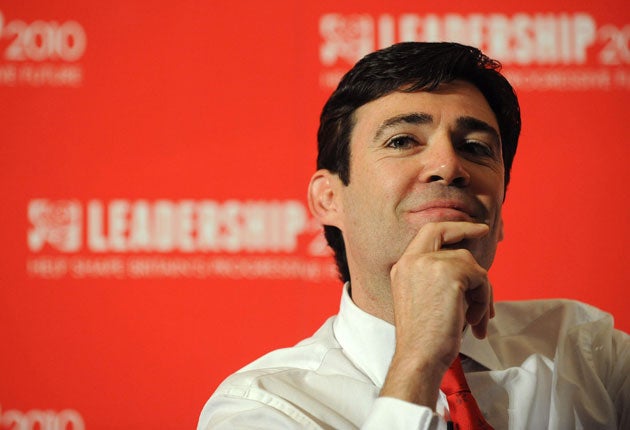Burnham's attack on party 'elite' reignites Labour leadership race

Your support helps us to tell the story
From reproductive rights to climate change to Big Tech, The Independent is on the ground when the story is developing. Whether it's investigating the financials of Elon Musk's pro-Trump PAC or producing our latest documentary, 'The A Word', which shines a light on the American women fighting for reproductive rights, we know how important it is to parse out the facts from the messaging.
At such a critical moment in US history, we need reporters on the ground. Your donation allows us to keep sending journalists to speak to both sides of the story.
The Independent is trusted by Americans across the entire political spectrum. And unlike many other quality news outlets, we choose not to lock Americans out of our reporting and analysis with paywalls. We believe quality journalism should be available to everyone, paid for by those who can afford it.
Your support makes all the difference.Andy Burnham today launches a scathing attack on the "self-serving elite" running Labour, pitching himself as the "anti-establishment" candidate in the battle for the Labour leadership.
He spells out detailed plans for rebuilding the party as the struggle to replace Gordon Brown resumes after a two-week lull in hostilities. Ballot papers will be sent out next week, with the leader declared at the start of the Labour conference on 25 September.
A hint of fraternal acrimony crept into the contest yesterday as David and Ed Miliband struck different notes on the importance of reaching out to middle-class voters. Mr Burnham has failed to match the number of union and local party endorsements attracted by the Miliband brothers, although his campaign team insists he is ahead of the other candidates, Ed Balls and Diane Abbott.
In an interview with The Independent, he depicted himself as the outsider trying to take on the well-organised Miliband machines by appealing to ordinary party members and union activists. "I don't have the support of the media establishment, the support of the union establishment or the support of the Labour establishment," he said. "It's a grassroots campaign."
He protested that Blair-Brown battles of previous years are "still being re-run through this leadership campaign" and argued that the party needed a "clean break with all of that". Mr Burnham, who has based his campaign in Manchester, said the party had been run for too long in "an elitist London-centric and controlling way" after New Labour was "born of a distrust of its members".
He added: "We still have a self-serving elite at the top of our party who put themselves and their own interests before those of the party and the members who put them into Parliament. We just can't have more of the same. Labour must rediscover its heart and soul."
Mr Burnham calls for an end to unpaid internships of more than three months, which can be afforded only by youngsters from better-off homes, and for free bus travel for teenage students.
He supports the creation of a National Care Service to improve the treatment of the elderly and vulnerable and to replace the national minimum wage with a "living wage".
In a newspaper article yesterday, David Miliband argued that the party needed to rebuild its appeal among all social groups. "You just can't craft an election majority out of a minority. It is dangerous to pretend that we don't need the middle classes, just as it would be to suggest Labour does not need to win back the hope and trust of working-class voters," he wrote.
But his brother, Ed, told Sky News Labour has lost more support among lower-income groups than better-off voters. He said: "In the 1990s, we were trying to win back mainly middle class voters. We now face a bigger challenge which is to win back middle-class voters who left us and our working-class so-called core vote or base which also left us at the election."
Join our commenting forum
Join thought-provoking conversations, follow other Independent readers and see their replies
Comments